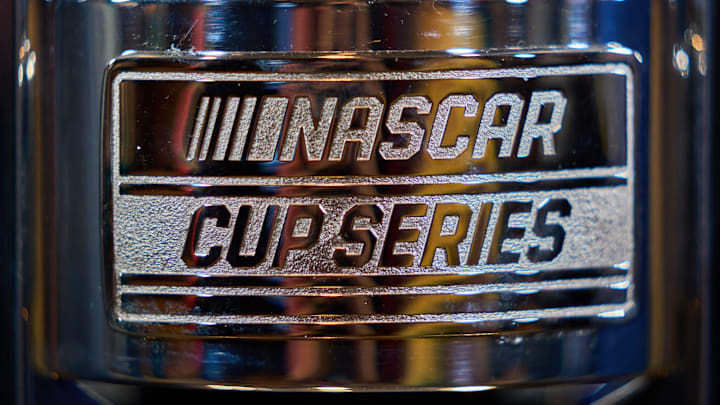CHRISTIE: With Lawsuit in Place, The Times They Are A-Changin' in NASCAR

In 1964, Bob Dylan released a song titled The Times They Are A-Changin'. 60 years later, the timeless piece of art could double as a poignant theme song about the current state of the National Association for Stock Car Auto Racing (NASCAR).
For more than 75 years, the sport has been ruled by the iron fist of the France family, and despite minor blips throughout the years of challenges to the machine in the form of an attempted driver union in the 1960s, and the formation of the Race Team Alliance in 2014, the France family has reigned supreme with very few obstacles in its path. Now, the family faces its biggest challenge yet in the form of an antitrust lawsuit from two of the race teams that make up the sanctioning body's premier racing series, the NASCAR Cup Series.
On Wednesday morning 23XI Racing, a team co-owned by NBA legend Michael Jordan, NASCAR Cup Series competitor Denny Hamlin and businessman Curtis Polk, along with Front Row Motorsports, a team owned by businessman Bob Jenkins, officially filed a federal antitrust lawsuit against NASCAR in the Western District of North Carolina.
Sure, a big portion of the lawsuit involves the NASCAR Charter Agreement, a document that every NASCAR Cup Series team, aside from 23XI and Front Row, signed allegedly under duress from NASCAR at the threat of having their charters ripped away. But 23XI's Polk says the lawsuit is about much more than just charters.
In a press conference on Wednesday, Jeffrey Kessler, the legendary antitrust attorney who has been retained by the teams, pulled back the curtain in an effort to further explain the decision to sue NASCAR in greater detail.
"I have spent much of my professional career bringing antitrust actions to different professional sports to try to create a fairer, more beneficial, more innovative system for those sports that benefits all of the stakeholders in those sports. There has never been a case that I have found that is as egregiously anti-competitive as this one," said Kessler. "Here we have a sport where one family has basically used its power to create an absolute monopoly for the benefit of that family as opposed to being for the benefit of the teams, the drivers, the sponsors, the broadcasters, the fans."
Among others, Kessler has fought the NFL, the NBA, the NCAA in antitrust lawsuits over the years. The man says none of the cases have ever looked more egregious than the one he is about to take on in the world of NASCAR. That alone speaks volumes, and should honestly serve as the biggest warning shot heading into the potential legal preceedings.
Kessler reiterated that the monopoly that the France family has acquired isn't due to any significant proprietary move by the family. Kessler alleges that the family has simply written a check over the years to eliminate any and all competitors, and in recent years has gone to larger and larger lengths to keep the teams in the NASCAR Cup Series from straying away from NASCAR.
"This monopoly didn't happen because of a superior product, because of the family's investment, because of their innovation. This monopoly has happened because of illegal monopolistic practices," Kessler detailed. "When there was a competitor, that competitor was acquired. When there were tracks that would enable another competitor to be formed, those tracks were acquired or they were subject to agreements that prevented them from being available to any other competitor. When the teams tried to think about forming their own circuit to create competition, the teams were subjected to restrictive covenants to prevent them from doing so. Then, they were told that their cars would be ones that the teams would build them and pay for them, but NASCAR would control them. So, they can't even be used in a competitive league."
The monopolistic practices being utilized by NASCAR and the France family led the race teams through the Race Team Alliance to retain Kessler for advisement through the latest Charter Agreement negotiations, which have strung along for a couple of years, with no end in sight. That is, until all but two teams magically decided to end the fight and sign the agreement on Friday, September 6. According to Kessler, NASCAR's bullying tactics, which forced the hands of the majority of the race teams to sign the deal, is what led 23XI Racing and Front Row Motorsports to finally say enough is enough.
"The final straw for these two teams is when NASCAR in an ultimate example, a classic example of monopoly abuse, went to the teams on September 6th and at 5:00 PM said, this is your deal. Either you take it, or you're not going to have any charters at all," Kessler explained. "Most of the teams, who have their livelihood invested in this, could not stand up to that monopolistic pressure, and they concluded that they were just going to have to do the deal.
"These two teams were not going to stand for it. There comes a time in most professional sports, and college sports as well if you're familiar with that situation, where a transformative moment comes where the sports either have to willingly restructure and adapt to change and make a fair competitive system, or the courts are going to force them to do so. We are at that moment now for stock car racing in the United States."
Kessler stated that neither 23XI Racing or Front Row Motorsports wanted it to end in an antitrust lawsuit, but after a couple-years-long fight, and then a pressure-packed ultimatum, they were left with no choice. This is a fork in the road moment for NASCAR, and Kessler feels regardless of what happens from here, the sport will improve for all of the stakeholders involved.
"Both of my clients wished that they never had to come to this moment. They wanted NASCAR to be a good partner. They wanted to find a way to restructure this voluntarily so that teams could actually have a fair chance to get a return on their investment and invest in this sport. NASCAR was not willing to engage in that type of a discussion. So, instead, we filed this case. We expect to win this case. And one way or another, stock car racing is going to change in this country for the better," Kessler said with confidence.
Kessler knows there will be challenges along the way, as this case is different from ones he has tried in the past, as NASCAR is owned by a single family at the top. But while some of the factors are different, the end problem is the same -- a sporting league fears competition and has done everything in its power to be the lone player in the industry.
'[NASCAR's] defense will be that if competition is brought into this industry that fans will run away, this sport will die, and that we'll never enjoy these sports again. History shows exactly the opposite. Whenever competition is introduced, fans love it," Kessler said. "There is a fairer allocation of the resources, greater investment takes place, and the sports progress. So, in that sense, it's very similar. The difference here, as you pointed out, there is no other major sport where one family has run that sport as its own personal fee stub and piggy bank the way NASCAR has been run.
"We will see what impact that has in terms of how they try to defend themselves. We will see what impact that has in terms of whether it is possible to settle this case or whether we have to take it all the way to trial. Either way, we are prepared to do what's necessary to effectuate change."
With NASCAR being a privately-owned sporting league, the teams and Kessler have very little to go off of as far as concrete information goes to see just how one-sided the revenue split in the sport has been over the years. But Kessler says they'll learn a lot more about the financials within NASCAR through discovery in the antitrust lawsuit trial.
"We know what we know from public information. We will find out a ton more through discovery," Kessler explained. "That is one of the advantages of federal antitrust litigation. We will be able to obtain financials. We will be able to follow the money. We will be able to see exactly how exploitive this system has been and how much injury it's inflicted on the teams and the drivers. Because when the teams have no money, that also directly kills the drivers, but the teams are the ones that compensate the drivers. So, it's a direct attack on both. The last time I spoke to a NASCAR fan, why they were interested, the reason they love this sport is about the teams and the drivers. Not about the France family."
While Kessler wouldn't expand on what he expects the final endgame to be for the teams in this situation, he said the goal is to create a system where teams, drivers, and all stakeholders in the sport get their fair share. Kessler says that hasn't been the case up until this point, and for anyone wanting to use the defense of, 'Well, if it's so unfair, why did all of the other teams sign the deal?' Kessler, who has been involved in more of these types of cases than perhaps anyone on the planet, says in these situations, victims, in this case, the race teams, take whatever they can get, because at the end of the day, it's better than nothing. But just because people sign on the dotted line, doesn't make the deal right for everyone involved.
"In every antitrust case, the victims are taking what they can get. The players who lacked free agency would agree to contracts. It didn't mean they weren't going to play, whether they were paid fairly or not. Or if you have a discrimination case and women or minority workers are not being fairly paid, they'll take the deal. It's better than not working, but sometimes there has to be those who have the courage, the resources, the willingness to stand up and say, 'We're not going to take it anymore.' And that will benefit all of them. So, no, it doesn't surprise me that a lot of the victims will continue to be victims until this wrong is righted," Kessler pointed.
As Dylan sang, "The line it is drawn. The curse it is cast. The clow one now, will later be fast. As the present now, will later be past. The order is rapidly fadin'. And the first one now, will later be last, for the times they are a-changin'."
The times are a-changin', alright. Grab your popcorn, folks. A situation that appeared nearly done and set in stone, is just getting started.
